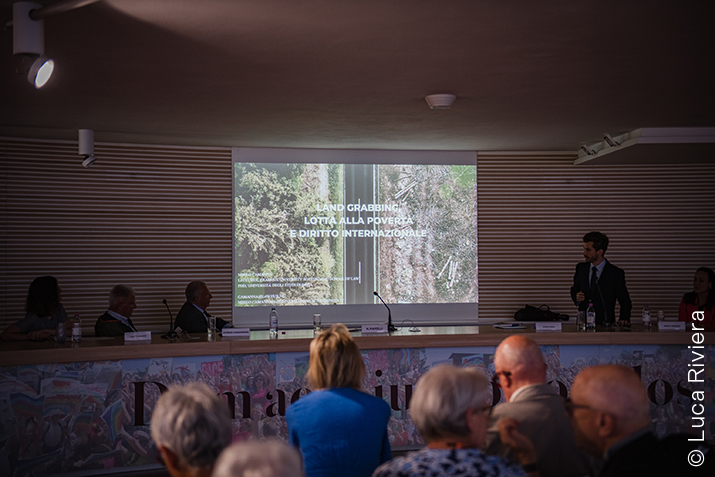SEMINAR AT THE BELL
ANTI-POVERTY INSTRUMENTS
Poverty, as suggested by Goal 1 of the UN Agenda 2030, can take many forms and arise from many causes: one of these causes is land grabbing, which can be defined as the large-scale acquisition of land, mainly in developing countries, by foreign investors or sovereign wealth funds. This acquisition is mainly aimed at producing or extracting raw materials for the food and energy sectors.
Normally, this acquisition takes place through specific agreements between the host country and the foreign investors, which do not provide for the outright transfer of the land but a lease or rent for extremely long periods (usually 99 years). The size of the land acquired by the investors is often immense: suffice it to say that the average size of a farm in Europe is 17 hectares, while some pieces of land subject to grabbing in Africa have involved more than 20,000 hectares.
Theoretically, large-scale investments in developing countries should not be bad and should yield benefits. In reality, however, land grabbing constitutes a form of impoverishment for everyone: the local population, the environment, the host country, and sometimes even the foreign investor himself.
Often the land leased to foreign investors is owned, inhabited and cultivated by local and indigenous peoples, who are not involved in the transfer agreements. In several cases, in order to ensure that companies could carry out their activities on these lands, the local populations were subjected to expropriations and forced removals from their lands, implemented also by threats or the use of force. Sometimes these acts have degenerated into strong protests by local populations, even in a violent form.
The expropriation of land affecting local and indigenous peoples also occurs due to certain peculiarities of the local legal systems. In many countries, especially in the African continent, there is often no concept of ownership comparable to that in the West, and there are no land registries. Therefore, many people have 'owned' land for centuries by virtue of unwritten customary rights. The absence of a legal title certainly facilitates the transfer of land to companies, since formally that land is 'free' and 'belongs to nobody'.
The fact that the local and indigenous population is not informed or consulted prior to the conclusion of the State-business agreements is also a violation of the principle of free, prior and informed consent enshrined internationally in important sources such as the International Labour Organisation Convention 169, according to which indigenous peoples must be consulted whenever measures affecting them are considered.
Often, the land involved in land grabbing is used for intensive agricultural production in the form of monocultures. Chemicals and pesticides are frequently used on these soils, consuming large amounts of land and water. In addition, severe deforestation can occur, necessary to make room for arable fields. This leads to significant soil degradation and impoverishment, as well as a significant loss of biodiversity and of the natural and landscape heritage.
These effects could be reduced by using organic and sustainable cultivation methods, or by introducing regulatory instruments to prevent environmental damage (such as impact assessments) or control systems during the production phase. However, the cultivation methods are often not sustainable and although environmental laws exist, they are not adequate or are not fully respected.
Developing countries often facilitate the conclusion of land deals and grant significant benefits to foreign investors, either because they are attracted by the prospect of economic and infrastructure development or because of internal and external political pressures. These benefits may consist, for example, in tax reductions or exemptions or immunities from the effects of environmental and social reforms. In addition, the same land is often sold for extremely low rents, with minimal bureaucratic procedures and without any guarantee on the part of the investors that part of the goods produced will be sold in the domestic market of that country.
Taken together, these investor benefits lead to a net reduction in the benefits that the host country might derive from foreign investment. Added to this are the costs the host country incurs to deal with the social and environmental problems that land grabbing can cause.
Due to friction between foreign investors, the host country and the local population, especially in the case of protests, there have been numerous cases where investment activities have been hindered, causing serious economic damage to companies or even preventing the effective commencement of the projects.
The existing friction points between international law and land grabbing appear to be multiple.
First of all, there are several internationally established human rights and principles that could potentially be violated, such as the right to property and housing, the right to work, respect for private and family life, respect for cultural heritage and in particular that of indigenous peoples, the right to a healthy environment, up to the rights of future generations and the principle of sustainable development.
Current international law does not provide for specific instruments to prohibit practices associated with land grabbing or for forms of liability on the part of public or private actors responsible for this practice. In addition, responsible investors and companies can also acquire, consolidate and maintain their position of strength through land deals or other instruments of international law for their protection.
On the other hand, current international law offers principles and instruments that, although not always created specifically for this purpose, allow for the protection of fundamental rights violated by land grabbing activities.
In some cases, the perpetrators were actually brought before national and international courts. The local population has also been supported by non-governmental organisations and the results of these actions, although mixed, demonstrate the existence of possible legal remedies. Indeed, there are tools, such as corporate social responsibility, human rights due diligence and the liability of multinational corporations for environmental and human rights damage, which are now the focus of debate and discussion, not only among academics. These instruments could better ensure the prevention and suppression of land grabbing involving private companies. The recent adoption of the European Union's directive on corporate sustainability due diligence is a significant example of the implementation of these tools, which will have to be tested in practice but can be viewed with confidence.
In any case, only through a concrete and internationally coordinated effort will it be possible to effectively address the phenomenon of land grabbing and promote equitable and sustainable development for all.
Mirko Camanna








